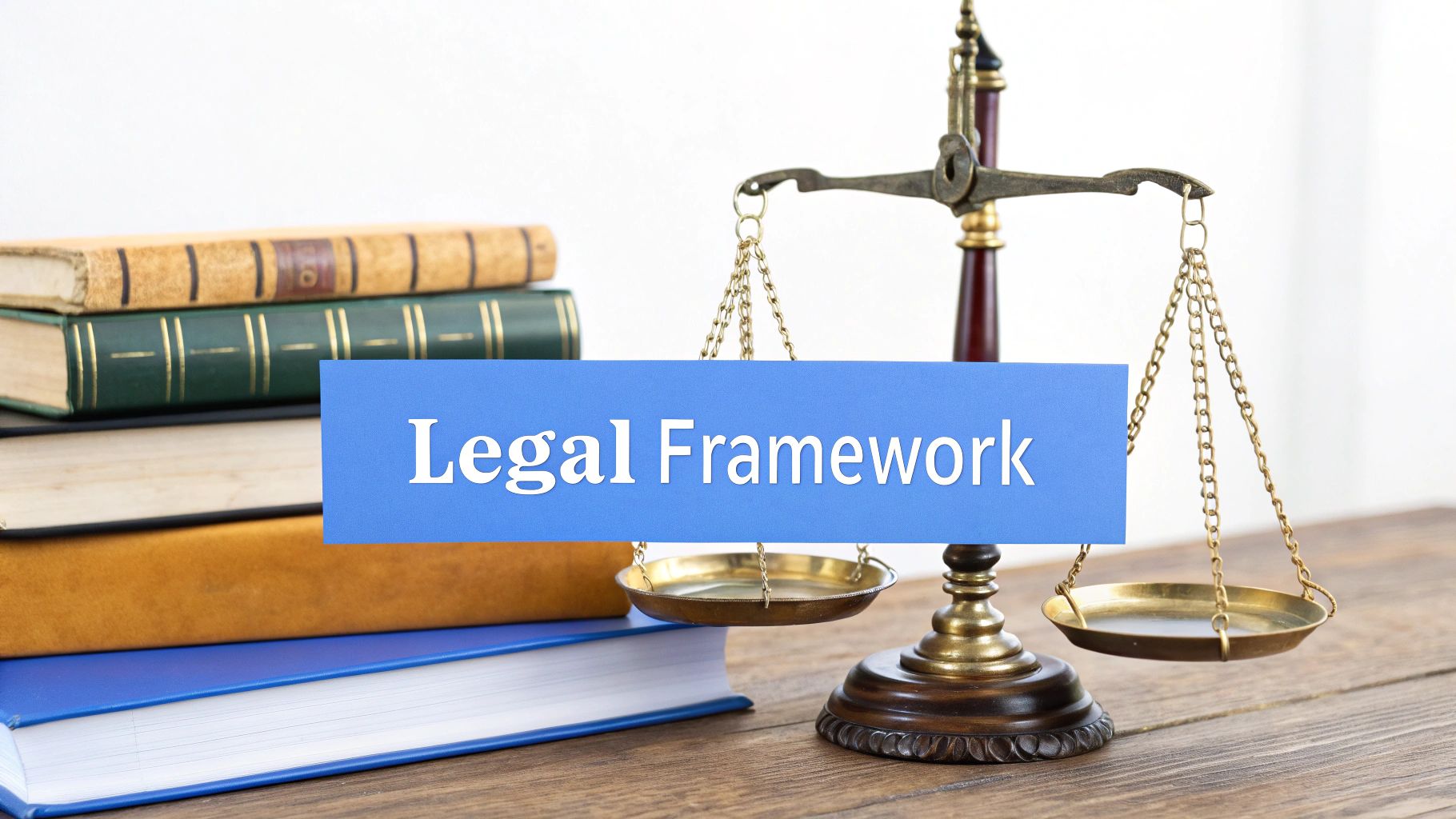What is Citizenship by Birth: Key Legal Insights

What Is Citizenship By Birth: The Global Landscape

Citizenship by birth, often called jus soli, grants citizenship based on birthplace. This principle significantly impacts individual opportunities, varying greatly from country to country. Countries like the United States and Canada recognize jus soli as a core part of their national identities. Others have adopted modified versions or rejected it entirely. This global variation leads to a complex and fascinating legal landscape.
Jus Soli Around the World
Many countries, especially in the Americas, adhere to jus soli. Being born within their borders automatically grants citizenship. This differs from jus sanguinis, or citizenship by descent, where citizenship is inherited from parents regardless of birthplace. These two principles, jus soli and jus sanguinis, interact to shape citizenship laws worldwide. Jus soli is crucial in nations like the United States. However, other countries, such as Nigeria, don’t grant automatic citizenship based solely on birthplace. They often consider the parents’ nationality.
While Nigeria’s focus isn’t primarily on citizenship by birth, the country has a substantial youth population due to high birth rates. The total fertility rate was 4.62 children per woman in 2022, resulting in a large number of children under 15. This demographic reality intersects with the legal framework around citizenship. Learn more about citizenship by birth here: IASServices.
Nigeria’s Approach to Citizenship
Nigeria primarily uses jus sanguinis, meaning Nigerian citizenship typically passes from parents to children. Birthplace can be a factor in certain situations but isn’t the deciding one. This focus on descent-based citizenship affects families considering childbirth abroad. For further information and articles on citizenship, visit the VisaMatchUK blog. Many Nigerians seek opportunities abroad, sometimes considering “birth tourism.”
Birth tourism involves traveling to a jus soli country specifically to give birth, thus granting their child citizenship in that nation. This practice raises important legal and ethical considerations. It’s essential to understand the complexities and potential implications before making such a decision.
The Issue of Visa Misrepresentation
Some individuals seeking birth tourism might be advised to misrepresent their intentions on visa applications. This is a serious matter with potentially severe consequences. Providing false information can lead to permanent visa bans and legal penalties. For more information on immigration-related topics, you might find the JapaChat’s blog helpful.
Pursuing global citizenship should always be done through legal and ethical channels. Honesty and transparency are vital in the immigration process. Building a future abroad requires careful planning and adhering to immigration laws. This ensures a secure and stable future for families.
Nigerian Citizenship: Beyond Birthplace Alone
Nigeria’s approach to citizenship differs from nations that grant it solely based on birthplace. To truly understand citizenship by birth globally, it’s essential to examine how Nigeria’s laws diverge from this norm. Rather than automatically granting citizenship to everyone born within its borders, Nigeria primarily uses citizenship by descent, legally known as jus sanguinis. This means a child’s citizenship is determined by the nationality of the parents, not the location of birth.
Understanding Jus Sanguinis in Nigeria
Jus sanguinis is a core principle of the Nigerian Constitution. This legal framework prioritizes an individual’s lineage as the key factor for citizenship. While being born in Nigeria isn’t sufficient for automatic citizenship, it can play a role in certain cases. For instance, a child born in Nigeria to unknown parents might be considered a citizen. However, parentage remains the primary determinant for the vast majority. This distinction is crucial for Nigerians considering having children abroad.
The Allure and Risks of Birth Tourism
Many Nigerians seek visitor visas to have children in countries like the United States, which follow jus soli citizenship policies. This practice, known as birth tourism, aims to secure an additional citizenship for the child, potentially providing access to improved educational opportunities and greater global mobility. However, this strategy carries inherent risks.
Some individuals are unfortunately advised to misrepresent their travel intentions when applying for visas. This is strongly discouraged. Providing false information during consular interviews can lead to serious repercussions, such as visa denial and permanent entry bans. These deceptive practices compromise the immigration system and can permanently jeopardize an applicant’s chances of legal immigration.
Nigeria’s Population Growth and Citizenship Laws
Nigeria’s population has seen a dramatic increase in recent decades, quadrupling since the 1970s to approximately 218 million by 2022. This growth is attributed to high birth rates and advancements in healthcare. While birthright citizenship isn’t the dominant framework in Nigeria, this population growth emphasizes the importance of clear and efficient citizenship regulations. Learn more: Demographics of Nigeria
Citizenship By Registration
In addition to jus sanguinis, Nigeria also offers citizenship by registration. This option is available to individuals married to Nigerian citizens. It’s essential to understand the specific criteria and processes for citizenship by registration, which include meeting residency requirements and demonstrating good character. This pathway provides a legal route to citizenship for spouses of Nigerians. This demonstrates that Nigerian citizenship isn’t solely based on descent, but also provides legal options for those with strong ties to the country.
Birth Tourism: The High-Stakes Reality

Birth tourism, the practice of traveling to another country with the specific intention of giving birth and securing citizenship for the child, is a multifaceted issue. It’s often misunderstood, and the motivations behind it are complex. Many Nigerian families consider this option, driven by the hope of a better future for their children.
This desire for better opportunities often includes access to high-quality education and healthcare, as well as increased global mobility. However, it’s essential to understand the full picture of birth tourism, including both the motivating factors and the potential downsides.
The Driving Forces Behind Birth Tourism
Many Nigerian families pursue birth tourism with the sincere goal of providing their children with enhanced opportunities. A foreign passport can unlock access to prestigious educational institutions and broader job markets. It can also significantly simplify international travel, offering a level of freedom that a Nigerian passport may not readily provide.
These factors, coupled with concerns about socio-economic instability within Nigeria, can make birth tourism a compelling option for many families. They are seeking a more secure and prosperous future for the next generation.
Jus Soli vs. Jus Sanguinis
This often leads prospective parents to consider countries like the US and Canada, which grant citizenship by birth, a legal principle known as jus soli. Nigeria, in contrast, primarily operates under the principle of jus sanguinis, or citizenship by descent. This key difference in legal frameworks is a major driver of birth tourism. It creates a strong incentive for those seeking alternative citizenship options for their offspring.
Nigeria experiences significant outflows of individuals seeking citizenship abroad through childbirth. Studies show Nigerian women represent a significant portion of “birth tourists,” often traveling to countries like Canada and the United States. They are motivated by the desire to obtain alternative citizenship for their children, which offers advantages like enhanced educational opportunities, greater travel mobility, and access to employment without the complexities of visa applications. In one study, Nigerian women made up 24.5% of birth tourists in Calgary, Canada. You can explore this topic further in this Birth Tourism Research article.
To better understand the destinations and their respective policies, take a look at the table below:
Top Destinations for Nigerian Birth Tourism: A comparison of popular countries where Nigerians travel to give birth, showing citizenship policies and benefits
| Country | Citizenship Policy | Key Benefits | Visa Requirements | Estimated Cost |
|---|---|---|---|---|
| Canada | Jus Soli (Birthright Citizenship) | Free healthcare, education, and social services; Easier access to other countries | Tourist Visa; May require additional documentation depending on individual circumstances | $8,000 – $20,000 |
| USA | Jus Soli (Birthright Citizenship) | Access to US education system and job market; Right to sponsor relatives for immigration later in life | Tourist Visa; May require additional documentation depending on individual circumstances | $10,000 – $30,000 |
| UK | Not Jus Soli (Birthright citizenship is conditional) | Access to UK education system and job market; Pathway to British citizenship if parent becomes settled | Varies depending on parents’ immigration status. A Standard Visitor visa may be an option for those who meet the criteria. | £5,000 – £20,000 |
This table highlights the varying citizenship policies and benefits associated with popular birth tourism destinations. The costs and visa requirements also vary significantly, underscoring the importance of thorough research and planning.
The Risks and Ethical Concerns
While the motivations are often understandable, birth tourism carries inherent risks, particularly concerning visa applications. Some individuals receive advice to misrepresent their intentions during consular interviews, a risky practice with potentially severe repercussions.
Misrepresenting information, even seemingly small details, on a visa application constitutes visa fraud. This can lead to immediate visa denial and, frequently, a permanent ban from entering the country. Such a ban can even extend to other nations, drastically limiting future travel possibilities.
The Importance of Transparency and Integrity
The pursuit of opportunities abroad should always be founded on honesty and strict adherence to legal procedures. While the desire for a better future is a strong motivator, engaging in deceptive practices can permanently jeopardize one’s ability to achieve these aspirations. Transparency and integrity are paramount throughout the entire immigration process.
Building a secure future in another country necessitates careful planning and respecting the laws of that country. The JapaChat’s FAQ section provides invaluable information and resources for Nigerians exploring international opportunities. It offers insights into legitimate pathways to global citizenship and stresses the importance of adhering to proper procedures. This proactive approach not only improves the likelihood of success but also ensures a more stable and secure future for families.
Legitimate Pathways To Global Citizenship

Many Nigerians aspire to global citizenship, often seeking better opportunities for their families. While some may consider birth tourism, numerous legitimate pathways exist to achieve this goal. These routes, while requiring effort and planning, offer a more secure and lasting foundation for a future abroad.
Exploring Skilled Worker Programs
Many countries actively seek skilled workers, providing visas and pathways to permanent residency. Canada’s Express Entry system and Australia’s points-based system are prime examples. These programs evaluate applicants based on education, work experience, language proficiency, and age. Successfully navigating these programs can lead to permanent residency and, ultimately, citizenship.
Education as a Gateway to Citizenship
For younger Nigerians, studying abroad can be a viable path to global citizenship. Many countries offer student visas, enabling individuals to attend their universities and colleges. Post-graduation, some countries offer opportunities to transition to work visas, potentially leading to permanent residency and citizenship. This approach facilitates integration into a new society.
The Power of Investment and Entrepreneurship
Some countries offer investor visas or entrepreneur programs, allowing individuals who contribute significantly to the economy a route to citizenship. These programs usually involve substantial investments in businesses or government-approved projects. While financially demanding, these programs offer a potentially faster path to citizenship.
Navigating the Naturalization Process
For those already residing abroad, naturalization is a common path to citizenship. This involves fulfilling specific residency requirements, demonstrating good character, and passing citizenship tests, often involving legal and financial effort.
International migration and related policies significantly impact discussions around citizenship by birth. Individuals from Nigeria and other African countries often seek citizenship in Europe or the Americas through these naturalization processes. Between 2017 and 2019, 11,360 Nigerians naturalized in the U.S., according to U.S. naturalization statistics. For more detailed statistics, see this report. Many Nigerians seek citizenship abroad for enhanced socio-economic opportunities.
The Importance of Honesty and Transparency
Honesty and transparency are paramount throughout the immigration process. Misrepresenting information, such as falsely stating travel purposes for birth tourism, can have severe repercussions, including visa denials and permanent bans. Building a future abroad on integrity is essential. For more information on immigration processes, see the JapaChat’s FAQs. Legitimate pathways, while demanding more effort and planning, offer a more secure and promising route to global citizenship, built on legal compliance and ethical conduct.
The Double-Edged Sword of Birth Citizenship

Birth citizenship, also known as jus soli, presents compelling advantages, especially for Nigerians hoping to secure a better future for their children. However, these advantages are coupled with significant responsibilities that often get overlooked in the quest for a foreign passport. This section explores both the benefits and obligations of jus soli, offering a balanced view of this complex topic.
The Allure of Jus Soli: Benefits and Opportunities
The main draw of jus soli is the immediate grant of citizenship and the doors it opens. A child born in the United States, for instance, automatically becomes a US citizen. This grants them access to the American education system, healthcare benefits, and ultimately, the right to work without needing a visa.
This also translates to increased global mobility. A US passport offers visa-free or visa-on-arrival access to numerous countries. This freedom of movement is particularly appealing to Nigerians seeking broader global prospects.
In addition, a child with citizenship in a jus soli country can eventually sponsor family members for immigration. This can be a strong motivator for families aiming to establish a life abroad together. For many, these benefits outweigh the financial and logistical hurdles of birth tourism.
The Weight of Responsibility: Obligations and Realities
The advantages of jus soli citizenship come with important responsibilities. A major obligation for US citizens, even those living abroad, is filing US taxes. This can be complicated, often requiring specialized understanding of US tax laws and how they might interact with Nigerian tax obligations.
Moreover, some countries with jus soli citizenship may have mandatory military service. This means a child born in such a country could be required to serve in their military when they reach a certain age, even if they’ve lived most of their lives elsewhere. Managing dual citizenship also presents its own set of challenges, requiring careful attention to the legal and administrative requirements of both countries.
Navigating the Complexities: Informed Decisions vs. Risky Shortcuts
It’s crucial to approach birth tourism with a thorough understanding of all its implications. JapaChat may offer helpful resources and information for navigating international relocation. The temptation to misrepresent information on visa applications, a practice sometimes suggested, carries serious risks. Visa fraud can result in permanent bans, effectively ending any hope of a future abroad.
Carefully weighing the benefits and responsibilities associated with birth citizenship is essential. Making informed decisions based on accurate information and ethical considerations is vital for securing a stable future abroad. While the appeal of jus soli is undeniable, pursuing citizenship through legal channels with full awareness of both the advantages and obligations provides a more secure and sustainable future. This approach guarantees that the pursuit of opportunity is built on integrity and respect for the law.
Navigating Citizenship Choices With Integrity
The desire for a better life often motivates Nigerian families to seek opportunities abroad, sometimes exploring options like birth tourism. However, the global landscape of citizenship and immigration is complex, and ethical considerations are paramount. This section explores the crucial role of integrity in navigating these choices and highlights the potential dangers of misinformation and taking shortcuts.
Addressing Misinformation and Misguided Advice
Unfortunately, some individuals seeking visitor visas to the US, with the intention of having children there, are sometimes advised to misrepresent their true purpose to consular officers. This is a risky and unethical practice. While the hope of securing a brighter future for one’s child is understandable, misleading immigration authorities can have severe, lasting, and often irreversible consequences.
The Dangers of Visa Misrepresentation
Providing false information on visa applications is considered visa fraud. This can lead to immediate visa denial and potentially a lifetime ban from entering the United States. Furthermore, such a ban can affect travel to other countries as well, severely limiting future international travel. These consequences can be devastating for families hoping to establish a life abroad.
The Importance of Honesty and Transparency
Building a secure future abroad requires integrity and strict adherence to immigration laws. Honesty and transparency throughout the entire visa application process are essential for maintaining a clean immigration record. Embracing ethical practices not only protects your future immigration prospects but also establishes a strong foundation built on trust and legality.
Practical Guidance for Nigerians
Seeking advice from reputable immigration lawyers and legal professionals is crucial. These experts can provide accurate, up-to-date information and guide you through the complexities of immigration law. Investing in professional counsel is a critical step in making informed decisions and ensuring your journey towards global citizenship is both ethical and sustainable.
Let’s examine the potential consequences of visa misrepresentation in more detail:
To better understand the implications of providing false information during the visa application process, the following table outlines the potential consequences of visa misrepresentation.
| Type of Misrepresentation | Immediate Consequences | Long-Term Impact | Potential Remedies |
|---|---|---|---|
| Falsely stating the purpose of your visit (e.g., claiming tourism when intending to give birth) | Visa denial | Permanent ban from the US; Difficulty obtaining visas for other countries | None, if a ban is imposed. Extreme difficulty even with qualified immigration counsel. |
| Hiding previous visa denials or immigration violations | Visa denial | Damage to credibility; Increased scrutiny in future applications | Seeking professional legal advice and disclosing all information truthfully in subsequent applications. |
| Providing fabricated documents (e.g., fake bank statements or employment letters) | Visa denial; Potential criminal charges | Severe damage to immigration record; Potential legal repercussions | None, if criminal charges are filed. Extreme difficulty even with qualified immigration counsel. |
This table clearly shows the severe penalties associated with visa misrepresentation, emphasizing the critical importance of honesty and transparency during the entire immigration process.
Building Legitimate Pathways to Global Mobility
Sustainable and ethical routes to foreign citizenship represent a more secure and reliable path for Nigerians seeking international opportunities. Skilled worker programs, educational opportunities, and investment options offer legitimate avenues for building a future abroad.
Start your journey towards global opportunities the right way. JapaChat, Nigeria’s AI immigration expert, can offer the accurate information and resources you need to explore legitimate pathways. Begin building your future with confidence and integrity. Explore JapaChat today!
Comments
One response to “What is Citizenship by Birth: Key Legal Insights”
-
[…] For families with children, Portugal offers various education options. International schools provide curricula aligned with global standards. Local Portuguese schools offer cultural immersion and language acquisition opportunities. This range of choices allows parents to select the best educational environment for their children. More information on citizenship by birth can be found here. […]

Leave a Reply